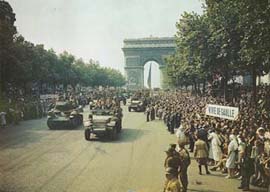
August 24, 2012

With the exception of the French Academy immortals Michel Déon and Jean d’Ormesson, two wonderful writers and both the epitome of charm and graciousness, the French can be a pretty silly lot.
They weren’t always. They got that way sometime between the two great wars. They turned even sillier during the German occupation and following their liberation from Eisenhower & Co. They were humiliated by Prussia in 1871, saved by America in 1917, and done in for good by Germany in 1940. Then followed the debacles in Indochina and Algeria.
I’ve just finished two books on Paris during the occupation and the liberation: one by Alan Riding about cultural life in the capital; the other a real gem called Paris After the Liberation, by Antony Beevor and Artemis Cooper. (There is also the Charles Glass book Americans in Paris.) Riding was a New York Times correspondent, which gave me bad vibes, but his book was fun to read. Except for the work of John Burns, it’s probably the only interesting thing I’ve ever read from someone employed by that temple of boring political correctness, predictability, and necrosis. Beevor and Cooper write beautifully and from the inside. They are husband and wife and her parents were Duff and Diana Cooper, he the British ambassador to the City of Light when there was very little heat and food after Jerry had left.
A very silly Englishman—I think Cottrell was his name—once asked me whether deep in my heart I wished to be English. I laughed out loud. I said if I could have been someone else, I would have chosen to be an officer of Rommel’s 25th Panzer Regiment of the 7th Panzer Division, the greatest fighting unit ever and one that beat the Frogs cleanly and honorably. In that incredibly dashing uniform with Paris literally at my feet, the frauleines would have come running.
We all know that Hemingway liberated the Ritz, but hardly any French people realize it was the Yankees who decided to move against Paris to prevent the city’s destruction, graciously allowing General Leclerc (a good one) to advance on the capital. Eisenhower meant to leave Paris in German hands for a time in order to allow Patton to follow the retreating Germans across northern France and into Germany. To take the city meant he’d have to feed it—which he did at the end—slowing the mercurial Patton, who was left without fuel and supplies.
This is not how the French write about the period. Not unlike the Austrians, who convinced the world that Beethoven was Austrian and Hitler a German, the Froggies to this day believe de Gaulle actually liberated them. But this is normal. Like von Moltke, the dour German field marshal who laughed out loud when one of his subordinates pointed out that a particular French town was impregnable (the only other time he laughed was when his mistress left him for an actor), the French need imaginary victories against the Germans almost as much as the Italians do.
In the face of defeat and occupation, the French responded with resignation and accommodation. Fascist French writers such as Céline, Pierre Drieu La Rochelle, Benoist-Méchin, Robert Brasillach, and Charles Maurras did not cheer but looked to Marshal Pétain to shield the nation. Communist writers such as Aragon and Beauvoir were tainted by 1939’s Molotov-Ribbentrop Pact.